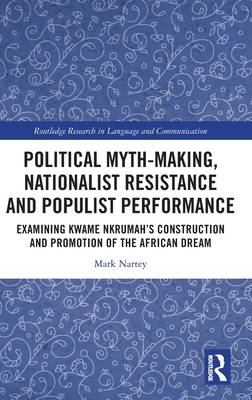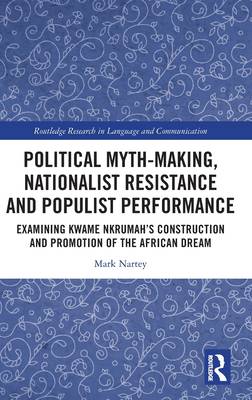
- Afhalen na 1 uur in een winkel met voorraad
- Gratis thuislevering in België vanaf € 30
- Ruim aanbod met 7 miljoen producten
- Afhalen na 1 uur in een winkel met voorraad
- Gratis thuislevering in België vanaf € 30
- Ruim aanbod met 7 miljoen producten
Political Myth-Making, Nationalist Resistance and Populist Performance
Examining Kwame Nkrumah's Construction and Promotion of the African Dream
Mark NarteyOmschrijving
Using the socio-political discourse of Kwame Nkrumah, a pioneering Pan-Africanist and Ghana's independence leader, Nartey investigates the notion of political myth-making in a context underexplored in the literature. He examines Nkrumah's construction of a myth described in the book as the Unite or Perish myth (i.e., the idea of a 'United States of Africa' being a prerequisite for the survival of Africa in the post-independence period), exploring the rhetorical resources he deployed, categorizing and analyzing key tropes and metaphors, and setting out the myth's basic components.
This book focuses on three areas: an investigation of political myth-making as a social and discursive practice in order to identify particular semiotic practices and linguistic patterns deployed in the construction of mythic discourse; the unpacking of the discursive manifestation, representation, features, and functions of political mythic themes; and finally to propose and implement an integrated discourse analytical framework to account for the complexities of mythic discourse and political narratives in general. It analyzes how Nkrumah deployed his discourse to concurrently construct heroes and villains, protagonists and antagonists, as part of an ideological mechanism aimed at galvanizing support for and instigating action on the part of the masses towards his lifelong African dream.
Nartey's book steps out from the conventional domain of critical discourse studies to focus on myth as a form of populist performance. It will be of interest to postgraduate students and academics in (critical) discourse studies, rhetorical discourse analysis, African and Diaspora studies, and African history, as well as non-academics such as journalists, political commentators, and people who consider themselves to be Nkrumaists and Pan-Africanists.
Specificaties
Betrokkenen
- Auteur(s):
- Uitgeverij:
Inhoud
- Aantal bladzijden:
- 188
- Taal:
- Engels
- Reeks:
Eigenschappen
- Productcode (EAN):
- 9781032109169
- Verschijningsdatum:
- 30/11/2022
- Uitvoering:
- Hardcover
- Formaat:
- Genaaid
- Afmetingen:
- 156 mm x 234 mm
- Gewicht:
- 462 g

Alleen bij Standaard Boekhandel
Beoordelingen
We publiceren alleen reviews die voldoen aan de voorwaarden voor reviews. Bekijk onze voorwaarden voor reviews.











